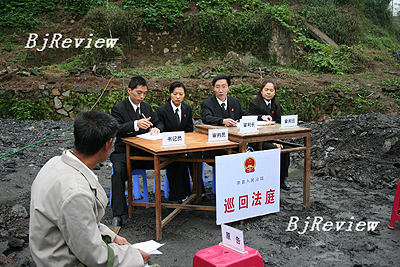
High in the hillside village of Longjiacun in Gongxian County, Sichuan Province, southwest China, four somber people dressed in dark-blue uniforms sit in a row behind two desks. A white sign that reads "mobile court" hangs at the front. A middle-aged man sits to one side, next to a red plastic stool with a tag that reads "plaintiff," and a smiling woman sits on the other side, with a tag that reads "defendant." Court proceedings go smoothly despite the ducklings waddling about.
You may have some ideas in your head about how a rural Chinese court operates. Maybe you think they are corrupt. Maybe you think villagers have no rights. But you probably didn't know that a "legal revolution" is happening in China, with a rapidly expanding system of courts and rights for citizens. The rural Chinese legal system is the subject of a new 45-minute documentary called The People's Court--China's Legal Revolution broadcast by the U.S. public television program Wide Angle. The series, now in its sixth season, broadcasts documentaries exclusively dedicated to international current affairs and is also one of the only series that concentrates on international human interest stories in the United States.
The case in Sichuan is one example the film uses to explore the shift to a "rule of law" system in China.
The plaintiff, a villager named Li Yaoquan, had accused his neighbor, Mrs. Li (her given name was unknown), of deliberately setting his bamboo and banana trees planted around his house on fire. Li Yaoquan had never seen the inside of a courtroom before. Regardless, he insisted on a trial. He explained that he had been inspired from a TV series in which Bao Zheng (999-1062), a senior judicial official in ancient China, seeks justice for ordinary people. The legendary Bao Zheng, or most commonly known as Bao Gong, is a household name in China as a symbol of justice and integrity. Li thought his own rights should also be claimed with the help of modern judges.
Li Yaoquan's dispute with his neighbor was then brought to a mobile court, which is usually set up in the open air in remote villages by traveling judges. It has exactly the same function as a local courthouse. The filmmakers said documentaries about China often focus on economic development, but the country's legal reforms are also an interesting subject.
"We looked at some of the most important issues facing the Chinese society today to find a subject that most people wouldn't be aware of and thought that a film on the law would be good to tackle," Maggie Still, producer of The People's Court, told Beijing Review. Still founded Xanadu Productions in the mid-1990s, a UK-based company that specializes in making films about China.
Still lived and worked in China back in the early 1990s and said it was then that she realized how important the country was going to be in the world. Still and some colleagues subsequently started the company, hoping "to reflect accurately what's really going on in China" through their camera lenses.
Just 30 years ago, there really wasn't a legal system in place at all in China, Still said, indicating that the country's legal system did not function well at that time. "We never used to talk about individual rights because the Chinese tradition emphasizes protecting society," explained Professor Wu from the Law School of Sichuan University in the film.
"The idea of the individual didn't count," Still added.
Legal revolution
Today, however, all citizens are recognized as equal before the law in principle, according to The People's Court, though "it's a work-in-progress."
Some Western scholars have said that a new revolution is underway in China, that is, the legal revolution. Though court reforms have lagged far behind China's economic reforms, the country now seems to be catching up, trying to embrace the traditional Western concept of "rule of law."
"In fact, it's the only society in history that has developed an entire legal system so quickly," Still said, based on her own experiences of living in China.
According to her documentary, in the past quarter century, China has opened nearly 400 law schools, trained hundreds of thousands of judges and lawyers, and launched educational campaigns to encourage people to bring their grievances to court rather than taking them to the streets.
| 